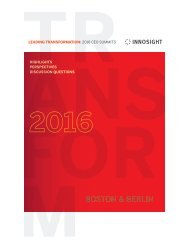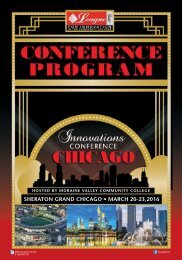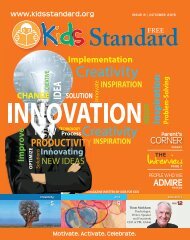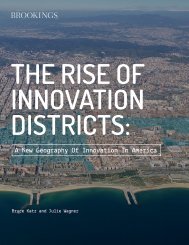TECHNOLOGY AT WORK
1Oclobi
1Oclobi
You also want an ePaper? Increase the reach of your titles
YUMPU automatically turns print PDFs into web optimized ePapers that Google loves.
February 2015<br />
Citi GPS: Global Perspectives & Solutions<br />
47<br />
Figure 38. Reshoring examples in recent years<br />
Company Products Investment Location From-To<br />
Year<br />
(announced) Jobs Reshore/New<br />
Apple Mac products $100 mn Texas, US China-US 2012 Reshore<br />
Caterpillar Small construction machinery - Georgia and Texas, US Japan-US 2011 > 1,000 Reshore<br />
Celebriduck Toys - - 2012 50 Reshore<br />
Farouk Systems Hair Dryers - - China-US 2009 1,500 Reshore<br />
Ford Cars $6,200 mn US 2011 12,000 New+Reshore<br />
GE Appliances $1,000 mn Kentucky, US China-US 2012 c. 1,000 Reshore<br />
K'nex Toys - Pennsylvania, US China-US 2020 25-30 Reshore<br />
Lenovo PC Manufacturing - North Carolina, US 2012 100 Reshore<br />
Masterlock - Wisconsin, US 2012 100 Reshore<br />
Motorola Cellphones - Texas, US 2012 2,500 New+Reshore<br />
NCR <strong>AT</strong>M manufacturer - Georgia, US 2009 c. 3,000 Reshore<br />
Nissan Cars (Sentra model) - Mississippi, US Mexico-US 1,000 Reshore<br />
Oracle Data centre services & storage systems - Oregon, US Mexico-US 430 Reshore<br />
Philips Shaver production - Drachten, Netherlands China-Netherlands 2011 - Reshore<br />
Selected Furniture Furniture - Indiana, US China-US 40 Reshore<br />
Trellis Earth Products Bioplastic goods $8.3 mn New York, US China-US 2013 189 Reshore<br />
United Technologies Elevators - South Carolina, US Mexico-US 2012 360 Reshore<br />
Whirlpool Small appliances $40 mn Ohio, US China-US 2014 400 Reshore<br />
Whirlpool KitchenAid hand mixers - South Carolina, US China-US 2012 25 Reshore<br />
Source: Citi Research, Company, WSJ, Huffington Post<br />
Robots and Japan<br />
Japan and its robot industry<br />
Japanese names also dominate the supply<br />
chain<br />
Auto industry is about one-third of demand<br />
in Japan, half in the US but maybe threequarters<br />
in China<br />
Data from the Japan Robot Association (JARA) show that in 2013 the Japanese<br />
market for robots was worth ¥402 billion ($4bn). Overall shipment value fell 4%<br />
year-over-year, with the biggest drop seen in chip mounters down by 18%. In 2014<br />
we think the market grew by over 20%, to close to ¥500 billion ($4.6bn), with CAGR<br />
of more than 10% expected over the next few years, as per volume forecasts made<br />
by the IFR. On a regional basis the largest and fastest growing market for the<br />
Japanese robot makers is China which now accounts for approximately 25% of total<br />
demand with the largest and most significant end user segment said to be the auto<br />
industry.<br />
The largest makers of industrial robots in Japan are Fanuc and Yaskawa, with 2014<br />
revenues of about ¥170 billion (+20% year-on-year) and ¥140 billion (+16%),<br />
respectively. Other smaller suppliers include Kawasaki Heavy, Nachi Fujikoshi and<br />
Daihen. However, we note that industry data from the JARA also includes chip<br />
mounters, which do not meet most people’s idea of a robot, and it is worth<br />
highlighting that revenues at Fuji Machine in 2014 grew by about 5%, to ¥52 billion,<br />
with other large mounter makers including Panasonic Factory Solutions, JUKI and<br />
Yamaha. On the component side, Fanuc and Yaskawa both use in-house made<br />
servo motors and controllers but there are a wide range of Japan-based component<br />
suppliers such as Nabtesco (with its 60% share in precision speed reducers);<br />
Harmonic Drive (a smaller, niche player in precision speed reducers which is also<br />
partly owned by Nabtesco); THK (roller bearings); and Obara (a leading maker of<br />
welding guns).<br />
Including chip mounters, data from the JARA showed that in Japan the auto industry<br />
made up ~35% of the value of industrial robot demand in the third quarter of 2014.<br />
This is relatively low compared to the US where the auto industry is said to make up<br />
about half of total demand. Yaskawa suggest that maybe 70% or more of its total<br />
industrial robot shipments are to the auto industry but this ratio is closer to 80% in<br />
China. It is quite clear that the challenge for Yaskawa, Fanuc and other robot<br />
makers in China is to expand applications in the non-auto industry.<br />
© 2015 Citigroup










